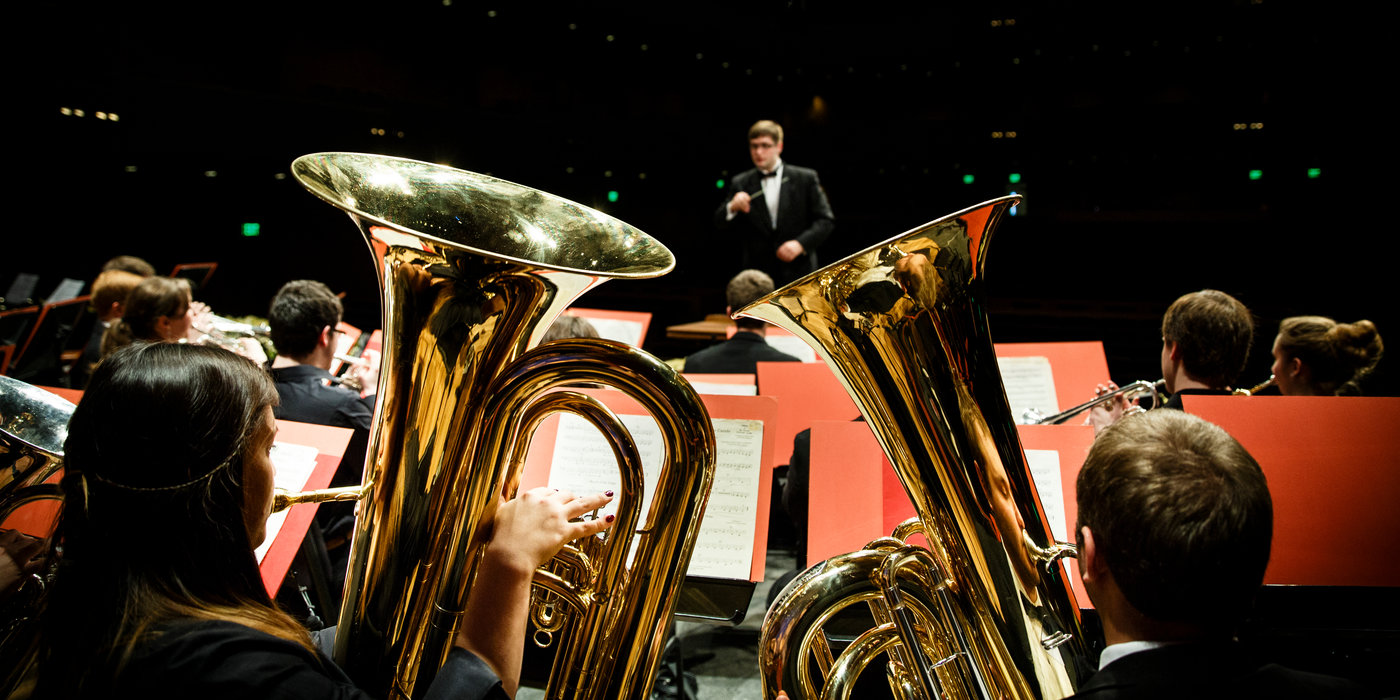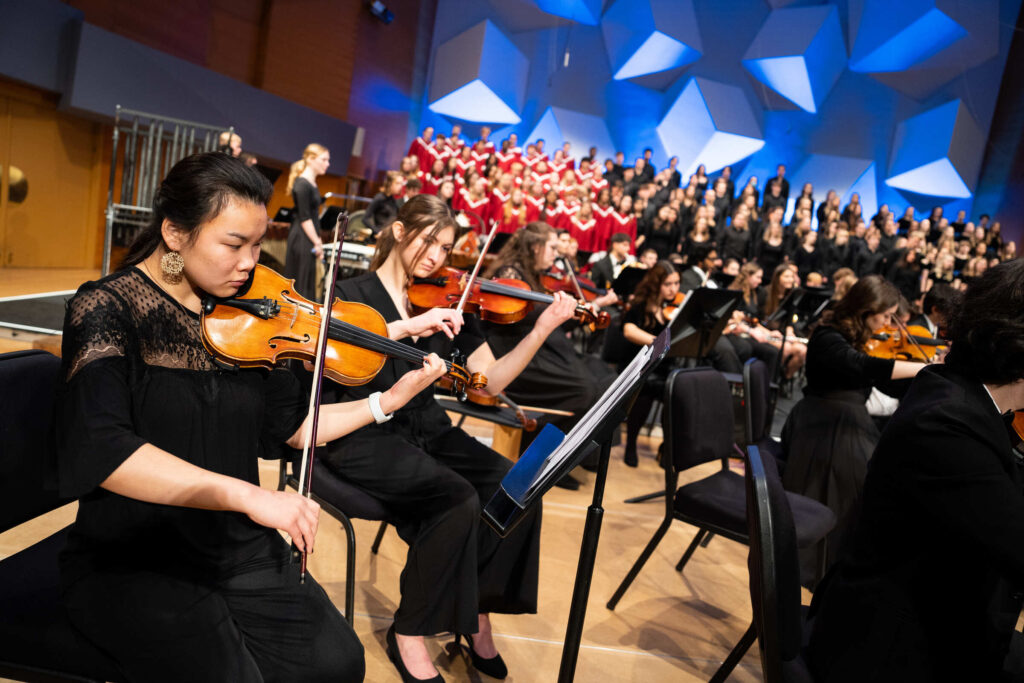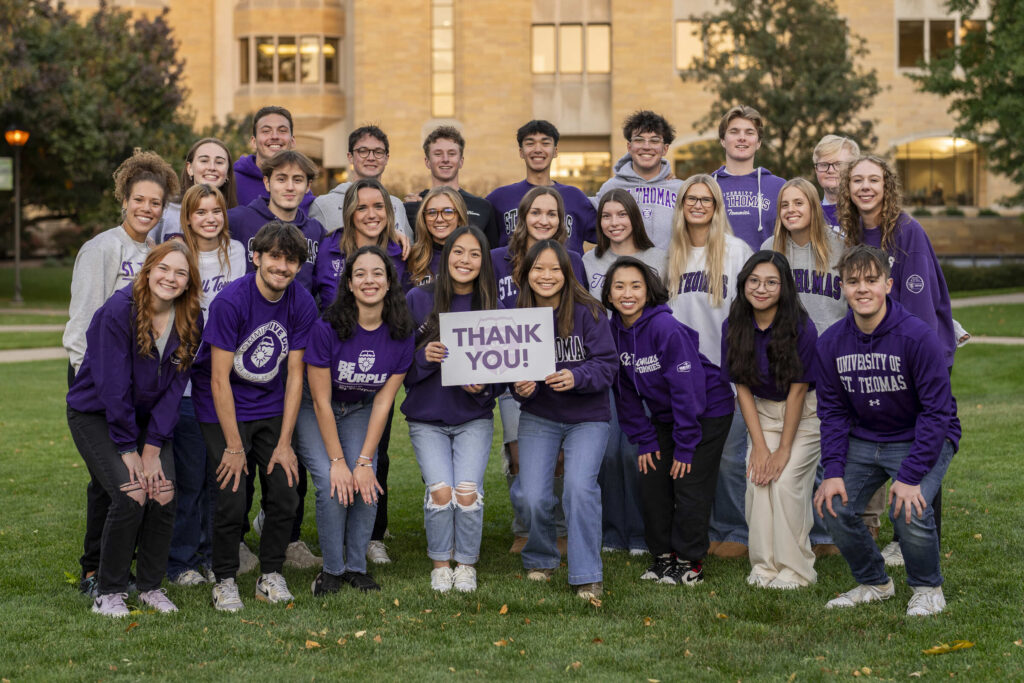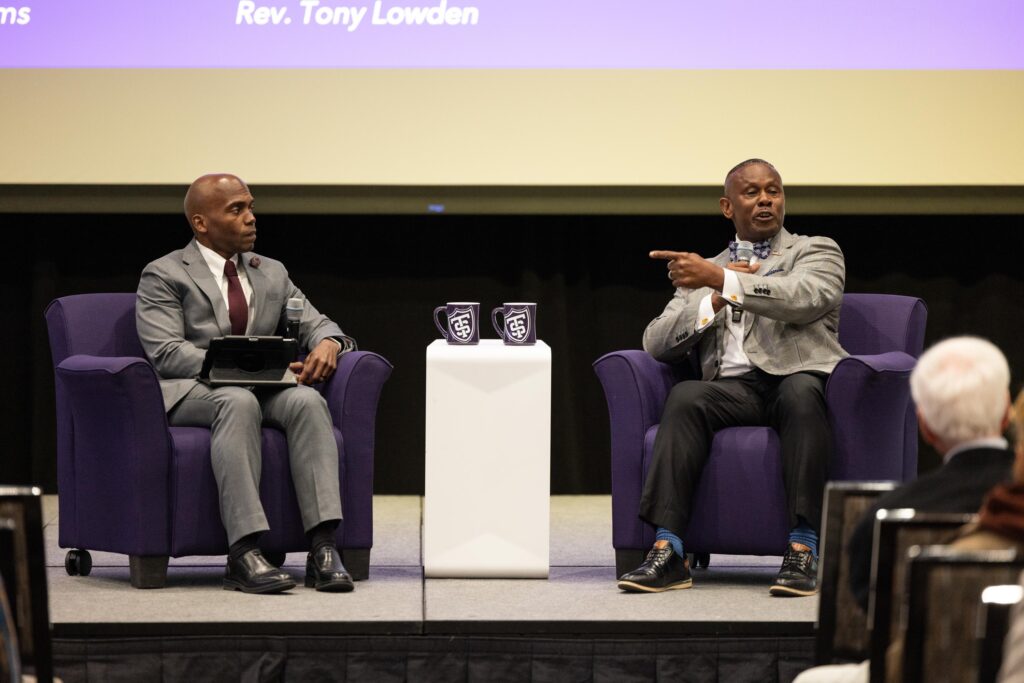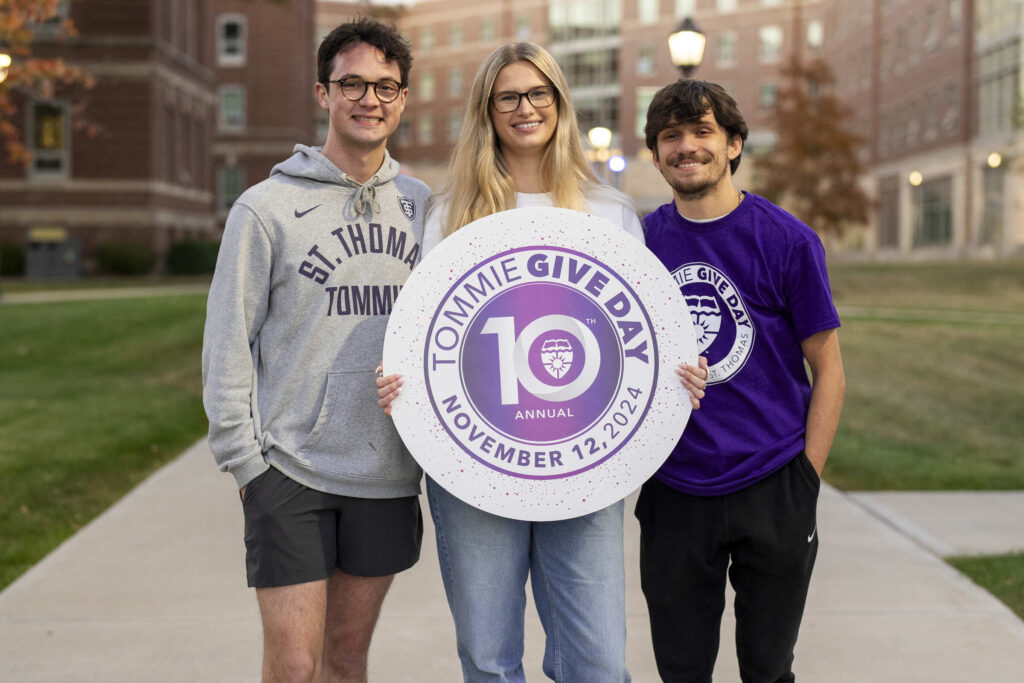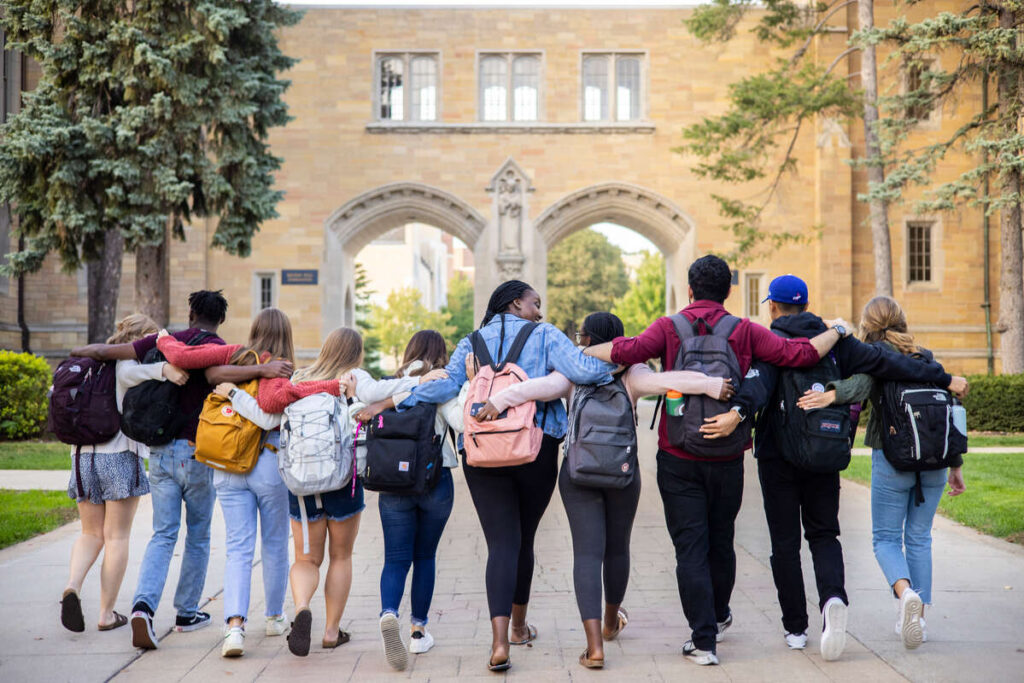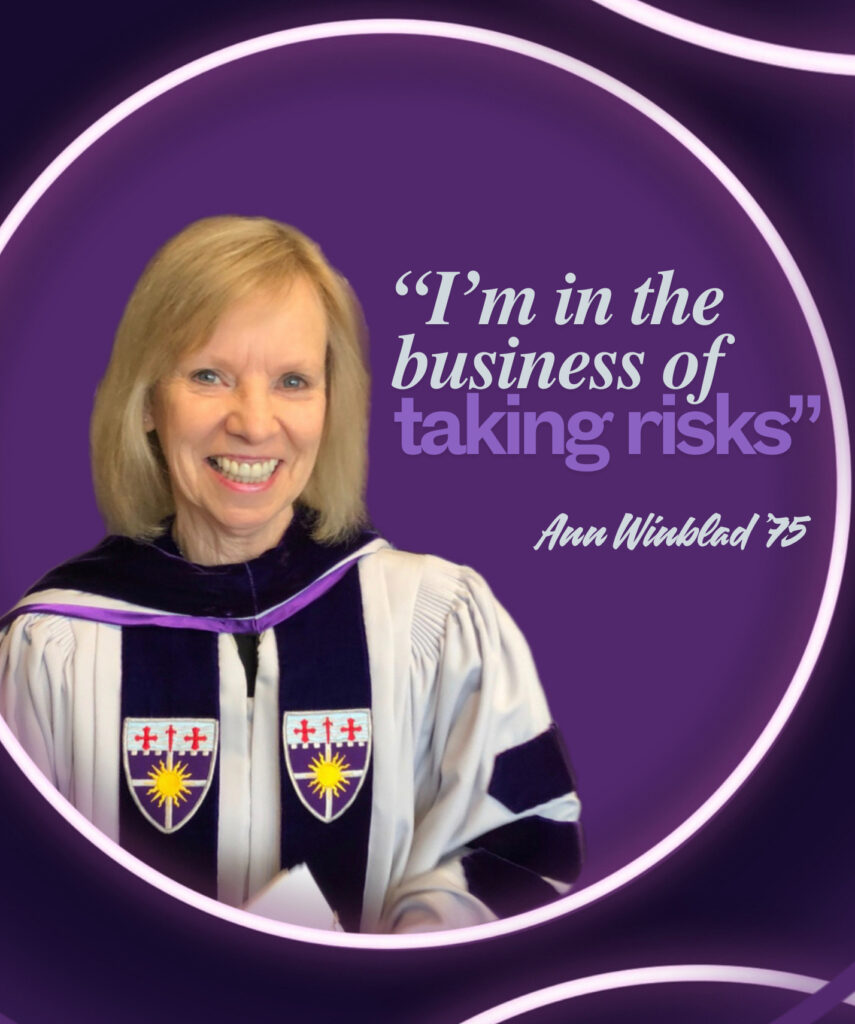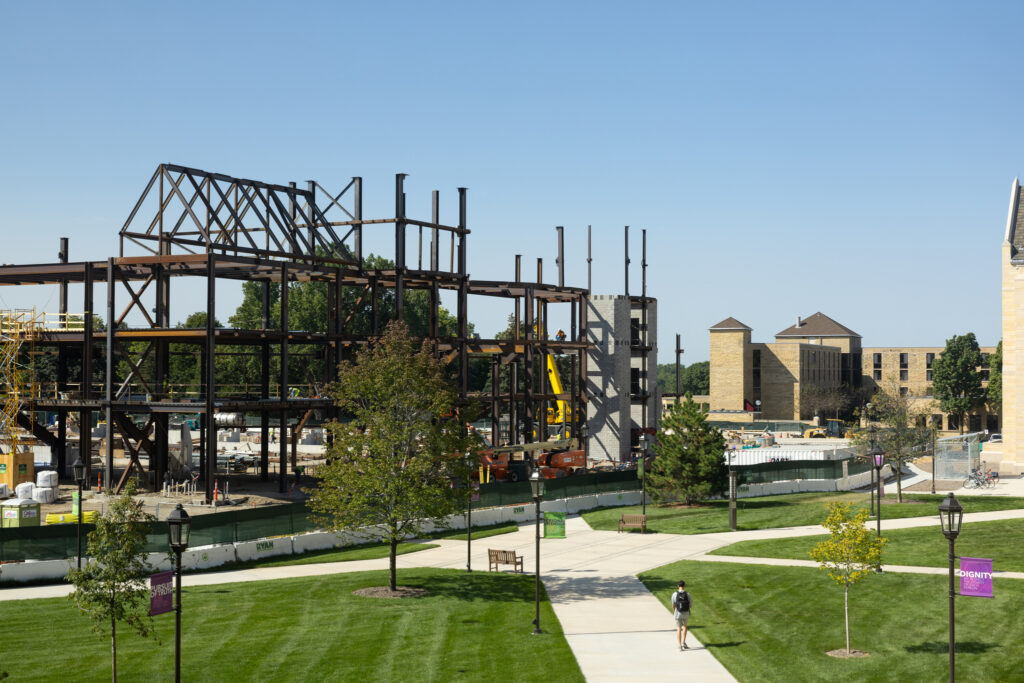Peter Wallace ’19 didn’t take a class on campus, study abroad or go home during J-Term his first year at St. Thomas. Instead, he started the process to become a certified emergency medical technician (EMT) through a program in St. Paul. It’s not surprising the biochemistry major said his academic studies and medical training have helped him grow as an EMT, preparing him to pursue medical school in the future. But there’s something else that has taught him how to think on his feet and improvise in critical moments – being a musician.
Wallace began piano lessons in kindergarten. Over the years he has played multiple instruments, including French horn and trumpet. At St. Thomas, he studied music theory and took banjo and harmonica lessons.
“We focus a lot on improvisation and techniques,” Wallace said about playing music. “You have to know what chords work in the section you’re playing and what notes from those chords you can take and make into your own improvisation. That really applies to medicine, because you’re given a problem and you have to solve it very quickly. You have your knowledge of biology of the human body and someone’s medical history, like what kind of medication they’re taking. You have to think of a solution that will quickly save their life without causing any adverse effects.”
Approximately 14% of undergraduate students at St. Thomas enrolled in a music course last year. While a majority of those students pursue majors other than music, the music program in the College of Arts and Sciences still figures prominently in their college experience. Whether they participate in band, choir, orchestra, ensembles or private lessons, the eclectic array of music-related offerings at St. Thomas introduces them to new cultures and experiences. Their musical involvement may take them across the globe for unique performance abroad opportunities. For some, time spent making music is a vital part of their well-being. Others will carry the skills they’ve developed as musicians into future careers in everything from medicine and environmental science to the clergy and journalism.
Many musicians at St. Thomas even have a chance to show off their musical chops on the big stage during the St. Thomas Christmas concert at Orchestra Hall in Minneapolis that features student performers from nine of the university’s ensembles. Christmas concerts are recorded and broadcast on public television stations across the country.
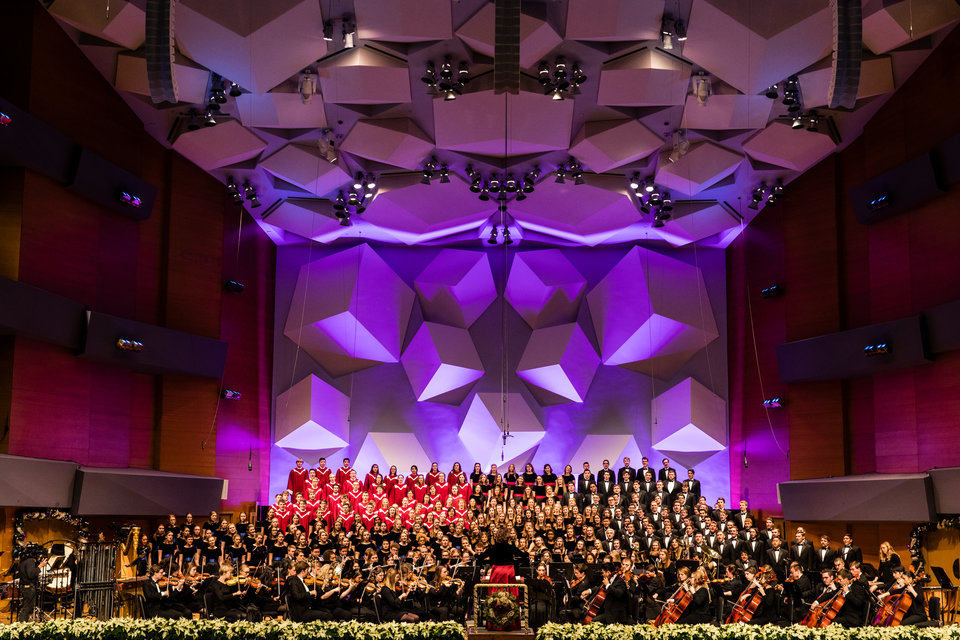
St. Thomas bands and choirs performs during the annual Christmas Concert at Orchestra Hall in 2017.
“There are more than 300 students on stage for our Christmas concert,” said Professor Matthew George, director of bands, orchestra, symphonic wind ensemble and string orchestra. “Probably 75-80 of them are music majors. We’re here to teach the whole person. We have a certain curriculum for our music majors, but that curriculum intersects with both their peers who are music majors exclusively, but also with nonmajors. That’s part of their experience at St. Thomas.”
Culture, family at home and abroad
Dean of the College of Arts and Sciences Yohuru Williams remembers watching the St. Thomas Christmas concert on television before he was even familiar with the school. A musician himself, Williams is a big believer in music education, noting students who participate in music have the ability to access and leverage creativity. Music and art are integral parts of culture and universities help us to understand and appreciate culture, he said.
“I think student musicians – similar to student-athletes – in a very tangible way contribute to campus life immediately,” Williams said. “Even as they’re learning, they’re producing beauty.”Gina Carter, a senior biology major, has been part of choir since her first year at St. Thomas. Through choir, she has performed at Orchestra Hall, traveled to Vietnam and volunteered in the community. She learned “music transcends language” during a trip to Vietnam.
“You can feel the emotion through whatever people are singing,” Carter said. “It doesn’t matter what language you’re singing in. We were able to connect with each other.”
George said during his more than two decades at St. Thomas, he has commissioned more than 90 original pieces of music for his students to perform.
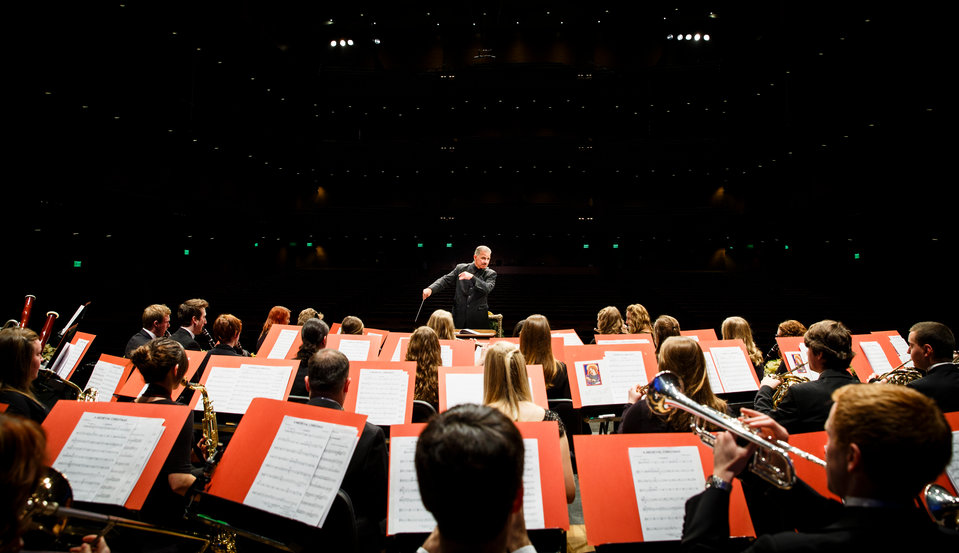
Professor Matthew George directs the symphonic wind ensemble.
“Whatever we can afford to give students, we should give them,” George said. “I think that’s what makes the St. Thomas experience stand apart from some other institutions. We bring in guest artists. We have opportunities for international travel where students are able to serve cultures that they visit through music.”
Senior Danielle Wong, a communication and journalism major, said music has played an important role in shaping her overall college experience. Wong, who has been singing, performing and doing musical theater since childhood, has participated in a variety of St. Thomas choral groups.
“As cliché as it sounds, joining a music community on campus is truly like joining a family,” Wong said. “Being involved with Cadenza and the Summit Singers has given me lifelong friends and a safe place to make mistakes and grow from them, whether they be directly music-related or not. Music can create environments where you can just be. It is such a privilege that there are days when I can hit the pause button on life and create something beautiful with people who are both alike and different from me in so many ways.”
A Source of Well-Being
Alex Lorang ’19, a philosophy and Catholic studies major, taught himself how to play guitar his senior year of high school and started lessons his first year at St. Thomas.
“I never thought it would become something this big in my life,” Lorang said. “When I’ve had a rough day, or I’ve heard some bad news, it’s either to the chapel or the guitar. Sometimes it’s both. That has been a real surprise to me. The fact I’ve pursued it in college is something I didn’t see coming, but I’m really grateful for it.”
Carter said a life without choir would be overwhelming and stressful.
“Going to choir after class, I just feel happier,” she said. “It’s a stress release and I love hanging out with the close friends I’ve made through choir.”
Jensen Stanton, a junior data analytics major, was drawn to St. Thomas for two reasons – the generous scholarship he received and the music program. Stanton, who participates in the string orchestra and a string quartet, has been taking violin lessons since he was six. He also plays piano and had an opportunity to learn viola at St. Thomas.
Stanton appreciates having many of the same opportunities as the music majors on campus. He’s able to be a musician on his “own terms,” he has found a group of folks he can “geek out” with over classical music and enjoyed bonding with fellow musicians during a performance trip to Mexico.
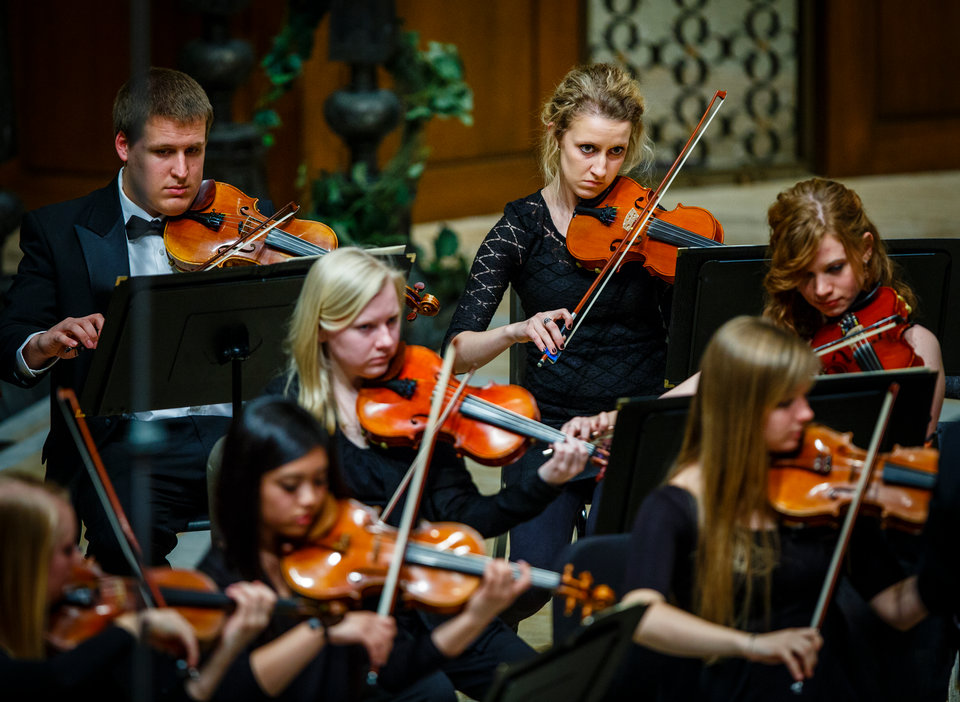
The St. Thomas string orchestra performs in the Chapel of St. Thomas Aquinas.
Playing music is often challenging, but also calming, Stanton said.
“I don’t have control over a lot of things in my life, but music is something I can control because it’s coming out of my fingers, it’s coming from my mind, it’s coming from my technique,” Stanton said. “It’s a good way to center myself.”
Music professor Christopher Kachian, who oversees guitar studies and ensembles, said music is a community activity that helps people in a myriad of ways providing everything from fun to relaxation. He compares that of performing in a musical group to playing on a sports team.
“In music everyone is going in the same direction,” Kachian said. “You’ve all invested your personal best in real time and then you’ve created an artistic entity. Most important, you’ve served an audience. You’ve worked together to create this thing. It’s a huge dinner party – it’s a potluck where everyone brings something.”
Benefits for Future Careers
Making music isn’t just about the formal performances, but the culmination of all the hard work and practice leading up to those big moments. Musicians develop many attributes while honing their craft, including discipline, quick thinking, self-accountability, teamwork, flexibility, vulnerability and the ability to digest constructive criticism – all of which may apply to whatever career students pursue.
Being part of a choir has been a great experience in working with a team for Carter.
“It’s a really collaborative process to make music with other people,” said Carter, who’s looking into a career as a physician’s assistant. “You have to be aware of those around you, blend in with them, work with them. And being a member of different groups and activities is appealing to employers and schools.”
Lorang, a seminarian, said his guitar background will come in handy in the future.
“Looking at my future life as a priest – God willing – there will likely be guitarists and other musicians I’ll encounter,” he said. “To have this knowledge and be able to approach it from an intelligent and well-informed perspective will be huge for that aspect of ministry.”
Senior Geena Stepp, an environmental science major, plays trumpet in the wind ensemble, jazz band and brass choir, and has traveled to Morocco, Spain and Portugal thanks to her musical involvement on campus. She added a music minor once she learned how easy it would be to fit it into her workload. She said she welcomes criticism from her music instructors because she knows it will ultimately make her better. She embraces the part music plays in her life.
“It looks really good to hiring people if music, as well as science, are on your resume,” Stepp said. “It shows you’re a well-rounded individual.”
Making music with people is special for many of the students who take advantage of the music program at St. Thomas, including Wong.
“It requires different muscles than group projects, where people are typically brought together to work on, and complete, a task,” Wong continued. “Music is always changing, always progressing, always being built upon. It requires listening to every member of an ensemble and connecting with one another on a level that surpasses verbal and physical boundaries. I genuinely believe everyone should participate in some kind of music ensemble during their college career. We can learn so much from the way music can connect us and build empathy for one another, something that can't necessarily be taught in every classroom.”
Peter Wallace says he can’t imagine a future in which he’s not playing music. It’s a creative release for him and he enjoys playing piano and bass guitar at his church. As he applies to medical schools this summer, Wallace plans to emphasize the important role music plays in his life. Minoring in music was a great opportunity, he said, for him to explore his love of music while also focusing on his biochemistry degree.
“People think if you’re really good at something, and you decide to go to college, you have to do that for your major,” Wallace said. “That’s not necessarily true. I love music, but it’s not what I would consider a profession for me. I would encourage people who have an interest in music to explore the music program at St. Thomas.”
